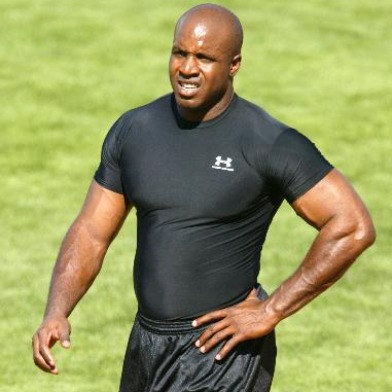 1:21 PM: A prosecutor told a federal jury in San Francisco today that Barry Bonds lied to a grand jury in 2003 because he had “a powerful secret”–a secret that he was using steroids to build his home-run records.
1:21 PM: A prosecutor told a federal jury in San Francisco today that Barry Bonds lied to a grand jury in 2003 because he had “a powerful secret”–a secret that he was using steroids to build his home-run records.
“All he had do to was tell the truth,” prosecutor Jeff Nedrow told the jury in the court of U.S. District Judge Susan Illston in his closing argument in the three-week trial.
But “he chose not to tell the truth and that’s why he’s here,” Nedrow said.
“The reason was the powerful secret he had been using steroids and human growth hormone in connection with his profession as a professional athlete,” the prosecutor said.
“He had concerns it would taint his accomplishments he had achieved during his career,” Nedrow said.
Bonds, 46, set Major League Baseball’s single-season home-run record in 2001 and the career record in 2007 while playing for the San Francisco Giants.
Bonds is on trial on charges of obstructing justice and telling three lies in 2003 testimony before a grand jury that was investigating sports drug distribution by the Burlingame-based Bay Area Laboratory Co-Operative, or BALCO.
The three alleged lies were his statements that he never knowingly received steroids or human growth hormone from his trainer Greg Anderson, or received any kind of injection from him.
The case is expected to go to the jury at the end of the afternoon after completion of defense closing arguments and a prosecution rebuttal.
Defense attorney Allen Ruby began his closing by declaring, “There has been a complete failure of proof by the government” on an essential element needed for a conviction.
That element, Ruby said, was proof that Bonds’ 2003 testimony was material, or relevant, to the grand jury’s work.
Under jury instructions read by Illston at the start of the day, jurors must conclude not only that Bonds knowingly made a false statement but also that it was relevant to the grand jury’s BALCO probe before they can convict him.
Ruby said prosecutors never explained during the trial how the grand jury worked or how Bonds’ testimony affected what the grand jury did.
The defense attorney also contended that prosecution witnesses lacked credibility.
“We respectfully submit that they have presented witnesses who are not to be believed,” he said.
Ruby and fellow defense attorney Cris Arguedas were scheduled to continue the defense closing this afternoon after a lunch break in the trial.
Because Anderson refused to testify–and was jailed for contempt of court–prosecutors relied mainly on circumstantial evidence from former associates of Bonds and a former girlfriend to try to prove that he showed signs of steroid use and allegedly was aware of them.
Bonds told the grand jury he took two substances called “the clear” and “the cream” that later identified as designer steroids, but told the panel he thought they were flaxseed oil and arthritis cream.
The prosecution’s strongest direct evidence relates to the charge that Bonds lied when he said he never received any kind of injection from Anderson.
Kathy Hoskins, a former personal shopper for Bonds, testified that she saw Anderson give him an injection of an unidentified substance in the navel in 2002 while she was packing for him for a road trip.
“You heard Kathy Hoskins testify directly that she saw him injected and that the defendant told her it was a little something for the road and couldn’t be detected,” Nedrow told the jury.
Prosecutors presented a total of 25 witnesses in the case and defense attorneys presented none.
11:25 AM: A prosecutor told a federal jury in San Francisco today that Barry Bonds lied to a grand jury in 2003 because he had “a powerful secret”–a secret that he was using steroids to build his home-run records.
“All he had do to was tell the truth,” prosecutor Jeff Nedrow told the jury in the court of U.S. District Judge Susan Illston in his closing argument in the three-week trial.
Nedrow said, “The reason was the powerful secret he had been using steroids and human growth hormone in connection with his profession as a professional athlete.
“He had concerns it would taint his accomplishments he had achieved during his career,” Nedrow said.
Bonds, 46, is on trial on charges of obstructing justice and telling three lies in 2003 testimony before a grand jury that was investigating sports drug distribution by the Bay Area Laboratory Co-Operative, or BALCO.
The three alleged lies were his statements that he never knowingly received steroids or human growth hormone from his trainer Greg Anderson, or received any kind of injection from him.
The case is expected to go to the jury this afternoon after completion of defense closing arguments and a prosecution rebuttal.
Defense attorney Allen Ruby began his closing by declaring, “In this case, the government has brought you no–zero–evidence on an essential element of this prosecution.”
That element, Ruby said, was whether Bonds’ 2003 testimony was relevant to the grand jury’s investigation. Ruby said prosecutors never explained during the trial how the grand jury worked.
The defense attorney also contended that prosecution witnesses lacked credibility.
“We respectfully submit that they have presented witnesses who are not to be believed,” he said.
Because Anderson refused to testify–and was jailed for contempt of court–prosecutors relied mainly on circumstantial evidence from former associates of Bonds to try to prove that he knowingly took the drugs.
Bonds told the grand jury he took two substances later identified as designer steroids, but said he didn’t know they were steroids.
Julia Cheever, Bay City News
Want more news, sent to your inbox every day? Then how about subscribing to our email newsletter? Here’s why we think you should. Come on, give it a try.









